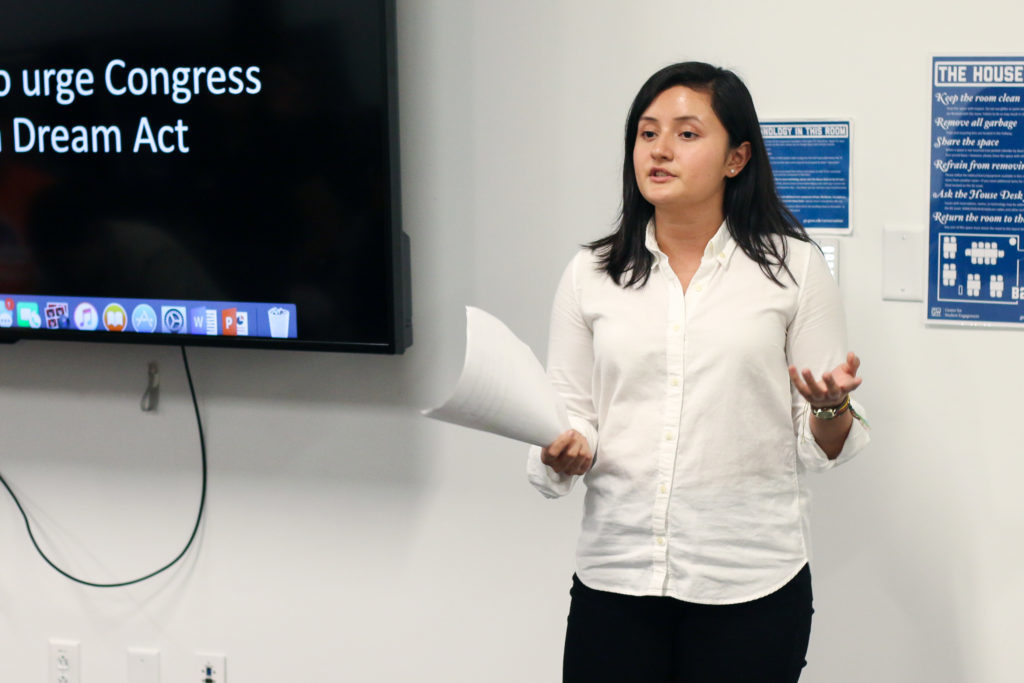When the Trump administration announced a rollback of protections for young undocumented immigrants in September – just a week into the academic year – senior Darcy Gallego was unsure what she could do to help.
She wasn’t personally affected by the decision to cancel the Deferred Action for Childhood Arrivals program, which granted leniency to undocumented immigrants brought to the United States as children – called “Dreamers” – and temporarily protected them from deportation. But Gallego, the daughter of two Colombian immigrants who were both undocumented when they first came to the U.S., decided to start GW Students for Dreamers, an informal coalition of students who strive to protect DACA recipients on campus and educate the public about the policy.
“I have friends who are DACA recipients,” she said. “I’ve grown up knowing people without documents, and I’ve witnessed their resiliency and strength. It’s difficult for me not to feel a call to action when I know I have the privilege of not having to worry about my legal status.”
The organization, started in September, is holding its first public events this week, a pair of “teach-ins” designed to inform students about the plight of Dreamers and urge students to sign a letter to Congress demanding legislative action to protect those students before the program ends in March. The group is also supporting a planned walkout in support of Dreamers Thursday.
These actions are the latest examples of widespread University and student backlash to the DACA decision, which student advocates and officials have said will prevent Dreamers from contributing to the University and hurt its overall educational experience.
At the first teach-in Monday, which drew an audience of about 40 students, immigration experts explained what DACA is and how students can be advocates and allies for those affected. The group plans to host a second teach-in Thursday.
“I think at the root of a lot of issues that we have in society is this lack of understanding and lack of education,” she said. “So I think the information relayed at the teach-ins is valuable in the sense that people genuinely understand what the program is, how it came about, kind of what happens now that it’s been rescinded and the effects that it has on Dreamers.”
While GW Students for Dreamers isn’t officially co-sponsoring Thursday’s walkout because it’s not an official student organization, Gallego said the club supports the protest and has encouraged others to participate.
The walkout, co-sponsored by Young Progressives Demanding Action, the GW College Democrats, Feminist Student Union and six other organizations, has 173 Facebook users planning to attend as of Wednesday evening. Similar walkouts are being planned at universities across the D.C. area.
Gallego said the group’s goal is to advocate for a “clean” Dream Act, a bill that would provide dreamers with a path to citizenship through Congress rather than an executive order like DACA.
The University has consistently voiced support for the program. Ahead of the decision to repeal DACA, several GW Dreamers said they feared that nixing the program would force them to be less visible. University officials said they would continue a longstanding policy not to ask students about their citizenship status on their applications and brought in an outside law firm to give free legal advice to undocumented students.
On Monday, the University announced it had joined a legal fight to restore the program, supporting a lawsuit aimed to prevent the program from being scrapped.
Senior Cristian Vides, who co-founded GW Students for Dreamers, said DACA is an important issue on campus because it affects many members of the community.
“You don’t realize who you’re sitting next to a lot of the time,” Vides said. “They may be the recipient of DACA status, or their parents or siblings might be, or even as simple as their fraternity brothers might be impacted by this.”
Henry Manning, a senior who attended the first teach-in and works as a research fellow at United We Dream, an immigrant youth organization leading the student walkouts Thursday, said educating the student body about how to be allies is vital because DACA can be “an incredibly murky subject” at a time when people need to take action in support of a Congressional solution.
“We need to get the DREAM Act through by December, because if we don’t get it by December, 2018 is an election year, and you know what they say about election years,” he said. “One of the organizers always asks, ‘what do we know about election years?’ Shit doesn’t get done. That’s what he always says.”
Dana Weekes, an associate at Arnold & Porter Kaye Scholer, a District law firm, who attended the teach-in Monday, said the public needs to be informed about what DACA is and what it does so that they can participate in “informed engagement.”
“I think everyone nowadays wants to march, and while marching is important, being an advocate with such knowledge is even more important at times, and so this is a grassroots movement that we’re trying to start on GW’s campus, and we’re trying to start it with people who are not only passionate but knowledgeable,” she said.
Meredith Roaten contributed reporting.





